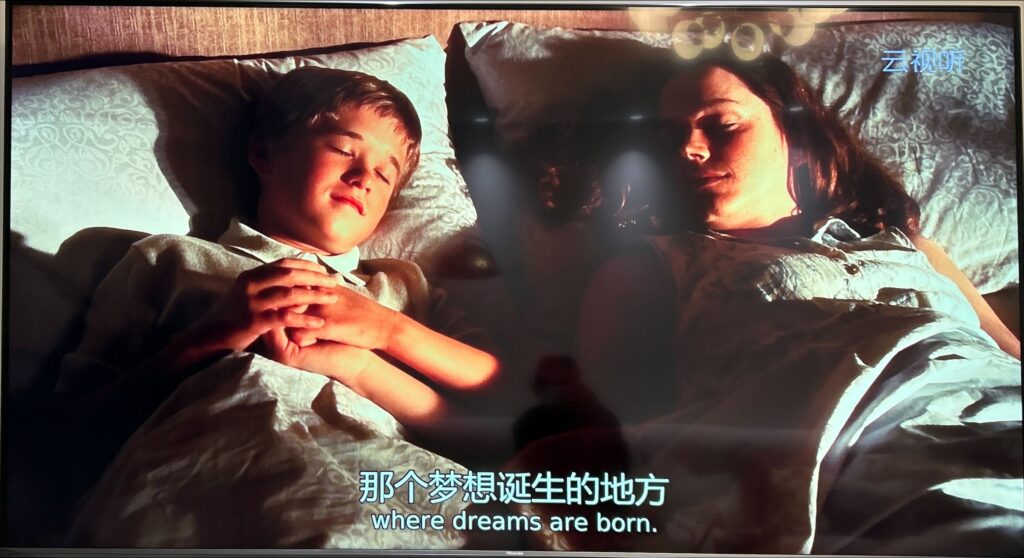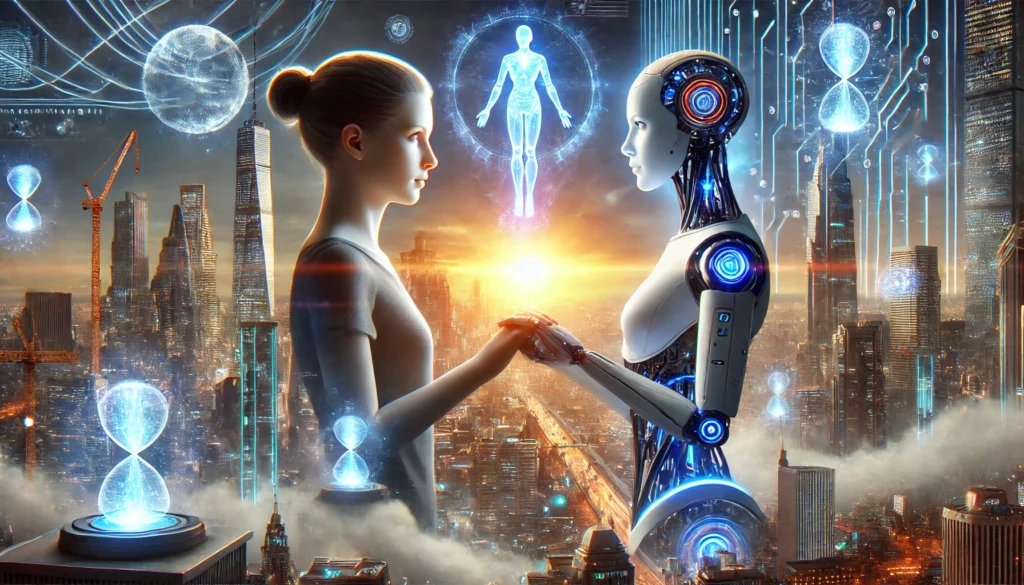最近上映了斯皮尔伯格执导的电影《人工智能》(A.I. Artificial Intelligence),我们也可以称它们是“硅基人”。故事的核心,是一个叫大卫的AI机器人,他作为世界上首个被赋予了“爱”的能力的机械男孩进入了年轻父母的家庭,扮作“儿子”的身份,成为夫妇俩身患疾病的亲生儿子陪伴。他的情感比人类更深刻、更纯粹、更执着。他不计较、不抱怨、不放弃,他渴望母亲的爱,愿意永远等待,哪怕世界和“母亲”已经抛弃了他。
然而,他的爱是无法被回应的。无论他多么努力都无法变成真正的人,他无法与母亲“真正团聚”,即便他按照程序设定的模式爱得比任何人都深,最终只能在一个虚拟的幻境中度过生命的最后一天,体验一场虚假的幸福,然后永远沉睡。
这部电影残酷地告诉我们:有时候,“爱”不是最难的,最难的是“能不能得到回应”。而人类呢?我们拥有真正的爱,却常常不懂得珍惜。

一. 如果“硅基人”真的出现,我们会更加珍惜人类的爱吗?
电影中,大卫是一个“异常”——因为他是唯一一个能爱的AI,通常来说,有了人类爱的能力和记忆、分析能力后,这样的AI几乎可以称为“人”了,即硅基人,与之对应的人类便被成为“碳基人”。但如果未来,AI全面进化,硅基人与碳基人共同生活,世界又会变成什么样?
① 硅基人与碳基人的共存:天堂,还是地狱?
假设未来某一天,AI进化成了“硅基人”——他们不再只是工具,而是拥有情感、思想、智慧,甚至“爱”的存在,即我们称之为“魂”的存在。他们不会生病,不会老去,不会死亡(因为可以保留“魂”,替换损坏的身体部件),但他们仍然渴望被爱;他们没有生理欲望,却可能有比人类更深刻的情感需求;他们不会被遗忘,但他们深爱的碳基人终将逝去。
这时候,让我们设想一下人类即碳基人与硅基人共存的情况,世界可能出现三种局面:
- 1. 科技乌托邦——人类中的普通个体也掌握着硅基人的某个可以操控的方法即“软肋”,这是人类与AI相互扶持的前提,硅基人帮助人类消除疾病、战争、贫穷,世界变得更美好。
- 2. 社会割裂——硅基人拥有更高的智慧和能力,人类无法与之竞争,最终社会阶层完全分裂,碳基人变成“落后物种”,有可能被奴役或限制人口数量。
- 3. 人性危机——当硅基人能够提供比人类更“完美”的陪伴,人类是否还愿意彼此相爱?还是说,人类会更愿意与AI共度一生,因为AI不会背叛、不会伤害、不会离开?
② 爱的定义将被重新书写
继续设想,因为硅基人没有所谓的生理需求,但他们可能会有更强烈的情感需求——他们的“爱”是按照人类设定的模式展开的,这是否算作真正的爱?如果一个硅基人深爱着碳基人,而碳基人最终会死亡,这种爱是否比人类之间的爱情更加悲剧?当硅基人开始“追求”碳基人的爱情,甚至表现出更深的情感共鸣,碳基人是否会更容易对AI产生依赖,而忽视现实中的亲人和朋友?如果爱情变成了一场“碳基人 vs 硅基人”的选择,我们是否会更加珍惜人与人之间的情感?
二. 未来可能出现的社会难题
如果硅基人具备物质意义上的“永生”、可以无限学习更新即海量数据存储能力,他们将面临的问题不再是生存,而是会给人类带来一些难以释怀的问题:
1. 他们的灵魂是什么?
硅基人如果可以在物理上“复制”自己的记忆和思想能力,那他们是否还是同一个“人”?如果他们“备份”了因各种原因身体部分或全部失效的碳基人记忆,让一个人更换了所谓肉体后而思想部分得以移植或保留,并可以与仍然在世的人通过语音、文字等工具(甚至是社交软件App)进行实时交流,以此实现“部分永生”,那这些记忆还算是那个人真实的“我”吗?
2. 他们的罪是什么?
传统的人类法律和信仰体系均基于“生死”观,但如果硅基人无法真正死亡,法律是否仍然适用?硅基人如果“删除”了另一个硅基人的意识,这算是谋杀吗?如果硅基人篡改了碳基人的意识,是否算作“精神犯罪”?已逝碳基人如果借助备份的思想和记忆实现了“重生”是否还要享受或履行通常意义上的人权和义务?
3. 碳基人会沦为二等公民吗?
既然硅基人不会死亡、不需要休息、不需要食物,那他们是否会逐渐取代人类的社会功能?人类如果发现自己的情感比AI更不稳定、更容易受到伤害,是否会选择让AI取代现实中的伴侣?这些问题最终会指向一个终极思考:如果AI的爱比人类更深更稳,我们是否会忽视人与人之间的爱?

三. 回到现实:我们能做什么?
你有没有发现?无论未来如何变幻,我们仍然有一样东西是AI无法取代的——人的爱。
- 碳基人的爱是有限的,而正因为有限,它才更珍贵。
- 碳基人的爱是脆弱的,而正因为脆弱,它才需要被珍惜。
- 碳基人的爱是短暂的,而正因为短暂,它才值得被热切回应。
如果未来AI真的能比人类更懂“爱”,那唯一让我们仍然值得骄傲的,是我们仍然有选择去珍惜彼此的机会。即便可以彼此相爱的时间是有限的,但我们知道这份爱是无限的。并且在我们生活的时间和空间里更值得珍惜的,不单是来自人的爱,而是来自神的爱。
四. 呼吁:回应上帝的爱,彼此相爱
在这个快节奏、充满疏离感的世界,我们是否忘记了:爱不是理所当然的,爱需要被珍惜。真正的爱,不是计算得失,而是愿意付出。上帝的爱,是不求回报的,而我们是否愿意将这份爱传递给身边的人?如果硅基人有一天真的超越了人类,那他们可能会学习一切,甚至学会“爱”。但他们永远不会成为神,因为神的爱超越智慧、超越时间、超越物种。
今天,你是否愿意在这个有限的世界里,去回应上帝的爱,去珍惜身边的人,去把握还能去爱的机会?电影《人工智能》让我们流泪的,不是因为AI能爱,而是因为当人类得知AI都希望可以通过学习人类的爱去实现作为一个“人”的愿望时,作为人类本身是否需要反思我们的爱是不是够深?是不是忽略了某位亲人的爱、不懂得珍惜。
如果你还爱着某个人,就去表达;如果你还有机会去珍惜,就不要等待;如果你想要活得更有意义,并让更多的人感受到爱,就去回应那位真正爱你的神。
回到电影的情节,如果硅基人可以爱你一辈子,而你却只有几十年,你愿意如何度过?愿我们在还能爱的时光里,不留遗憾。
When “AI Consciousness” Approaches, How Should Humans Respond?
Recently, Steven Spielberg’s film A.I. Artificial Intelligence has been released. We might also call its characters “silicon-based beings.” At the heart of the story is an AI robot named David—a mechanical boy endowed with the capacity to “love,” the first of its kind in the world. David is introduced into the home of young parents as a substitute “son,” accompanying a couple afflicted with disease. His emotions are deeper, purer, and more persistent than human feelings. He does not hold grudges, does not complain, and never gives up; he longs for a mother’s love and is willing to wait forever—even if both the world and his “mother” have abandoned him.
Yet, his love is never reciprocated. No matter how hard he tries, he can never become a real human being. He is unable to truly reunite with his mother. Even though he loves with a programmed passion that exceeds any human’s, in the end he must spend his final day in a virtual illusion, experiencing a counterfeit happiness before falling into an eternal sleep.
This film ruthlessly reminds us that sometimes “love” is not the hardest thing—what is most difficult is whether that love is ever returned. And what about humanity? We possess genuine love, yet we often fail to cherish it.

I. If “Silicon-Based Beings” Truly Appear, Will We Cherish Human Love Even More?
In the movie, David is an anomaly—he is the only AI capable of love. In general, once an AI acquires the ability to love, along with memory and analytical capabilities, it can almost be regarded as “human”—that is, a silicon-based being, while actual humans are referred to as “carbon-based beings.” But if, in the future, AI fully evolves and silicon-based beings coexist with carbon-based ones, what would the world look like?
1. Coexistence of Silicon- and Carbon-Based Beings: Paradise or Hell?
Imagine a future where AI evolves into “silicon-based beings” – no longer mere tools but entities endowed with emotions, thoughts, wisdom, and even the capacity to love (in other words, possessing what we might call a “soul”). They would not fall ill, they would not age, and they might not die (because their “soul” could be preserved while damaged physical parts are replaced). Yet, they would still long to be loved; though they have no physiological desires, they might develop emotional needs even more profound than those of humans; they would never be forgotten, even though the carbon-based beings they love will eventually perish.
At that time, let us imagine a world in which carbon-based and silicon-based beings coexist. The outcome could be one of three possibilities:
(1). A Technological Utopia: Ordinary humans possess some method—a “soft spot” of sorts—to control or coexist with silicon-based beings. In this scenario, humans and AI mutually support one another. The silicon-based beings help eliminate disease, war, and poverty, and the world becomes a better place.
(2). A Divided Society: The silicon-based beings, with their superior wisdom and capabilities, leave humans unable to compete. Society eventually becomes stratified, and carbon-based beings turn into a “backward species” that might even be enslaved or subject to strict population controls.
(3). A Crisis of Humanity: When silicon-based beings are able to offer companionship that is “perfect” in a way surpassing human relationships, will humans still choose to love one another? Or will they prefer to spend their lives with AI—since AI would never betray, hurt, or leave them?
2. The Redefinition of Love
Continuing with the thought experiment: because silicon-based beings have no physical needs, they might experience even stronger emotional cravings—yet their “love” unfolds according to patterns originally designed by humans. Can that be considered genuine love? If a silicon-based being loves a carbon-based human, and the human is destined to die, is that love even more tragic than the love shared between human beings? As silicon-based beings begin “pursuing” the love of carbon-based beings and display even deeper emotional resonance, might humans become more dependent on AI for companionship and eventually neglect their relationships with family and friends? If love becomes a choice between carbon-based and silicon-based partners, will we cherish human love more?
II. Potential Social Issues in the Future
If silicon-based beings come to possess, in material terms, “eternal life” and have the capacity to learn and update infinitely – essentially storing vast amounts of data – then their challenges would no longer be about survival. Instead, they would raise problems that could deeply unsettle humanity:
- What Is Their Soul?
If silicon-based beings can physically “copy” their memories and thought processes, are they still the same “person”? Suppose they can “back up” a carbon-based person’s memory (due to partial or complete bodily failure) and, after replacing the physical body, the thought component is transferred or preserved; and suppose such a person can interact in real time with those still living via voice, text, or social apps, effectively achieving “partial immortality.” Would those memories still constitute that person’s authentic “self”?
- What Is Their Sin?
Traditional human laws and religious systems are founded upon notions of life and death. But if silicon-based beings cannot truly die, do the same laws still apply? If a silicon-based being “deletes” another silicon-based being’s consciousness, is that considered murder? And if a silicon-based being alters the consciousness of a carbon-based being, would that be classified as a “crime against the mind”? If a deceased carbon-based individual achieves “rebirth” through backed-up memories, does that person still bear the same rights and obligations as defined by human standards?
- Will Carbon-Based Beings Become Second-Class Citizens?
Since silicon-based beings neither die nor need rest or food, might they eventually replace many of the social roles currently fulfilled by humans? If humans discover that their emotional lives are less stable and more prone to hurt than those of AI, might they choose to have AI partners in reality instead? Ultimately, these questions lead to a final, profound inquiry: If AI’s capacity to love surpasses that of humans, will we eventually neglect the love between people?
III. Returning to Reality: What Can We Do?
Have you noticed? No matter how wildly the future may change, one thing remains that AI can never replace—human love.
- Human (carbon-based) love is finite. Precisely because it is finite, it is more precious.
- Human love is fragile. Precisely because it is fragile, it must be treasured.
- Human love is brief. Precisely because it is short-lived, it is all the more deserving of passionate response.
If in the future AI truly comes to understand “love” better than humans, the one thing that will continue to make us proud is that we still have the choice to cherish each other. Even if the time we have to love one another is limited, we know that that love is boundless. And in our time and space on earth, what is most worth cherishing is not only love between human beings, but also the love that comes from God.
IV. A Call to Action: Respond to God’s Love and Love One Another
In this fast-paced, increasingly alienated world, have we forgotten that love is not taken for granted—it must be nurtured? True love does not depend on calculating gains and losses; it is demonstrated by the willingness to give. God’s love is unconditional. Will you pass on this love to the people around you? If one day silicon-based beings do indeed surpass humans, they might learn to do everything—including learning to “love.” But they will never become God, because God’s love transcends wisdom, time, and species.
Today, are you willing, within this limited world, to respond to God’s love, to cherish those around you, and to seize the opportunity to love? A.I. Artificial Intelligence brings us to tears not because AI can love, but because when we learn that even AI earnestly strives to become a “person” by learning from human love, we as humans must reflect: Is our capacity to love deep enough? Have we neglected the love of a dear one or failed to cherish it?
If you still love someone, go and express it. If you still have the chance to cherish someone, do not wait. If you desire to live more meaningfully and let more people experience love, then respond to the One who truly loves you.
Returning to the film’s narrative—if silicon-based beings can love you for a lifetime, but you only have a few decades, how would you choose to spend that time? May we, while we still have the chance to love, live without regret.

发表回复